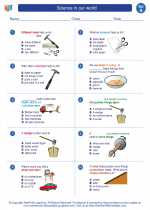Domains
A domain in science refers to a specific area of knowledge or a distinct category of living organisms. In biological taxonomy, the highest level of classification is the domain. There are three domains of life: Archaea, Bacteria, and Eukarya.
Archaea Domain
The Archaea domain consists of single-celled microorganisms that are prokaryotic, meaning they lack a cell nucleus and other membrane-bound organelles. They can be found in a variety of environments, including extreme habitats such as hot springs, salt lakes, and deep-sea hydrothermal vents.
Bacteria Domain
The Bacteria domain also consists of single-celled prokaryotic organisms. They are found in diverse habitats, including soil, water, and within other organisms. Some bacteria are beneficial, while others can cause diseases.
Eukarya Domain
The Eukarya domain includes all organisms with eukaryotic cells, which have a true nucleus and membrane-bound organelles. This domain encompasses a wide range of organisms, including plants, animals, fungi, and protists.
Study Guide for Domains:
- What are the three domains of life?
- Describe the characteristics of organisms in the Archaea domain.
- Explain the significance of the Bacteria domain in various ecosystems.
- What are the defining features of organisms in the Eukarya domain?
- Provide examples of organisms belonging to each domain.
Understanding the domains of life is essential for comprehending the diversity and classification of living organisms. Studying and familiarizing oneself with the characteristics of each domain can provide valuable insights into the fundamental principles of biology.
.◂Science Worksheets and Study Guides First Grade. Science in our world

 Worksheet/Answer key
Worksheet/Answer key
 Worksheet/Answer key
Worksheet/Answer key
 Worksheet/Answer key
Worksheet/Answer key
 Vocabulary/Answer key
Vocabulary/Answer key
 Vocabulary/Answer key
Vocabulary/Answer key
